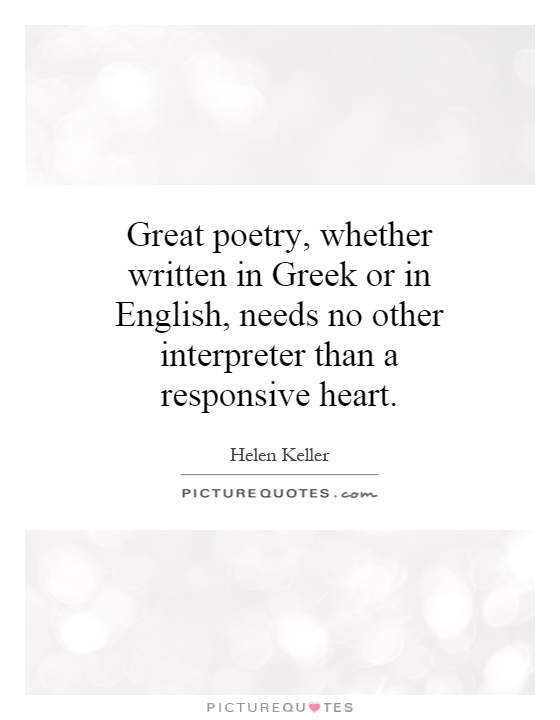Great poetry, whether written in Greek or in English, needs no other interpreter than a responsive heart

Great poetry, whether written in Greek or in English, needs no other interpreter than a responsive heart
Helen Keller, a remarkable woman who overcame incredible obstacles to become an influential writer and advocate for the disabled, understood the power of great poetry to speak directly to the heart. Keller, who was both deaf and blind from a young age, learned to communicate through touch and eventually through the use of sign language. Despite her disabilities, she was able to appreciate and create beautiful poetry that resonated with readers around the world.Keller's own poetry often focused on themes of nature, spirituality, and the human experience. Her words were simple yet profound, touching on universal truths that transcended language barriers. Keller believed that great poetry had the ability to connect with people on a deep emotional level, bypassing the need for translation or interpretation. She understood that the true beauty of poetry lies in its ability to evoke a visceral response in the reader, stirring the soul and sparking a sense of wonder and awe.
In her autobiography, "The Story of My Life," Keller wrote about the transformative power of poetry in her own life. She described how the works of poets like Shakespeare, Keats, and Browning had a profound impact on her, opening up new worlds of imagination and emotion. Keller believed that poetry had the ability to transcend the limitations of her physical disabilities, allowing her to experience the full range of human emotions and experiences.
Keller's own poetry, such as her famous poem "Autumn," reflects her deep connection to the natural world and her profound sense of gratitude for the beauty and wonder of life. Her words are imbued with a sense of awe and reverence for the world around her, reminding readers of the importance of living in harmony with nature and appreciating the simple joys of existence.












 Friendship Quotes
Friendship Quotes Love Quotes
Love Quotes Life Quotes
Life Quotes Funny Quotes
Funny Quotes Motivational Quotes
Motivational Quotes Inspirational Quotes
Inspirational Quotes